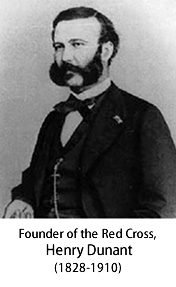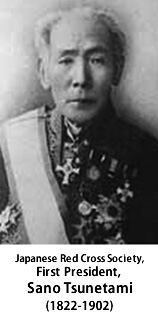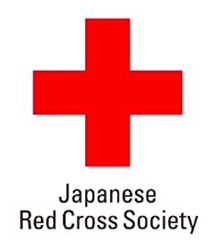
Spirit of Foundation
During Japan’s Seinan Senso (Southwestern War), which involved a rebellion led by Takamori Saigou of the Satsuma Domain against the Meiji government, Sano Tsunetami and Ogyu Yuzuru established the ‘Hakuaisha’ (later the ‘Japanese Red Cross Society’) based on their knowledge of the Red Cross Society from the World Exhibition in Paris. They aided the wounded regardless of whether they were enemies or allies.


Japanese Red Cross Academy of Nursing and its affiliated colleges follow the humanitarian principles of the Red Cross “regardless of enemies or allies” and “cherish human life and dignity.” We aim to develop human resources who aspire to protect human life and health as future nurses and care providers. We provide them the advanced nursing and care provider education required to obtain the certificates they aim for.
Japanese Red Cross Academy of Nursing and its affiliated colleges expect our future alumni, in the spirit of the Red Cross, to take an active part in protecting human life and dignity in large-scale disasters and disputes regardless of nationality, as well as faithfully carry out their mission as nurses and care providers.
Therefore our curriculum includes not only the techniques and knowledge required for nurse and care provider certificates, but also fundamental knowledge of the Red Cross and international humanitarian law, as well as the skills and techniques of disaster nursing and international health.

Aiming to save people who are suffering, we will protect human life, health and dignity under any circumstances.
Fundamental Principles of the Red Cross
Humanity
The Red Cross, born of a desire to bring assistance without discrimination to the wounded on the battlefield, endeavors—in its international and national capacity—to prevent and alleviate human suffering wherever it may be found. Its purpose is to protect life and health and to ensure respect for the human being. It promotes mutual understanding, friendship, cooperation and lasting peace amongst all peoples.
Impartiality
It makes no discrimination as to nationality, race, religious beliefs, class or political opinions. It endeavors to relieve the suffering of individuals, being guided solely by their needs, and to give priority to the most urgent cases of distress.
Neutrality
In order to continue to enjoy the confidence of all, the Red Cross may not take sides in hostilities or engage at any time in controversies of a political, racial, religious or ideological nature.
Independence
The Red Cross is independent. The national societies, while auxiliaries in the humanitarian services of their governments and subject to the laws of their respective countries, must always maintain their autonomy so that they may be able at all times to act in accordance with Red Cross principles.
Voluntary Service
The Red Cross is a voluntary relief movement not prompted in any manner by desire for gain.
Unity
There can be only one Red Cross society in any one country. It must be open to all. It must carry on its humanitarian work throughout its territory.
Universality
The Red Cross is a worldwide institution in which all societies have equal status and share equal responsibilities and duties in helping each other.